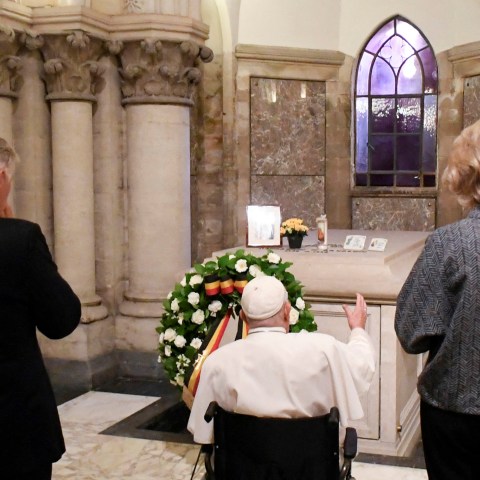In concluding catechesis on mercy in the Old Testament, Pope Francis considers King David’s “Miserere”VATICAN CITY — Here below we publish an English translation of Pope Francis’ Wednesday audience catechesis on March 30, 2016.
Dear brothers and sisters,
Good morning.
Today we conclude the catecheses on mercy in the Old Testament, and we do so by considering Psalm 51, called the Miserere. It is a penitential prayer in which the request for forgiveness is preceded by the confession of sin, and in which the one praying, in allowing himself to be purified by the Lord’s love, becomes a new creature, capable of obedience, a steadfast spirit and sincere praise.
The “title” that ancient Hebrew tradition has given this psalm refers to King David and his sin with Bathsheba, the wife of Uriah the Hittite. We know the story well. King David, who was called by God to tend to his people and guide them on the way of obedience to the Divine Law, betrays his mission, and after having committed adultery with Bathsheba, has her husband killed. An ugly sin! The prophet Nathan reveals his sin to him and helps him to acknowledge it. It is the moment of reconciliation with God, in the confession of his sin. And here David was really humble, he was great!
Whoever prays with this psalm is invited to have the same sentiments of repentance and trust in God that David had, when he saw the error of his ways and, despite being king, humbled himself without fear of confessing his guilt and showing his misery to the Lord, but convinced of the certainty of his mercy. And what he did wasn’t a small sin, a little lie: he committed adultery and murder!
The psalm begins with these words of supplication:
“Have mercy on me, O God,
according to thy steadfast love;
according to they abundant mercy, blot out all my transgression.
Wash me thoroughly from my iniquity,
and cleanse me from my sin!”—Psalm 51:1-2
The invocation is addressed to the God of mercy, so that moved by a great love, like that of a father or mother, he might have pity (i.e., grant grace), and show favor with benevolence and understanding. It is a heartfelt plea to God, who alone can free us from sin.
Very pliable images are used: blot out, wash me, cleanse me. In this prayer, what man truly needs is made manifest: the only thing we really need in our lives is to be forgiven, delivered from evil and its consequences of death. Unfortunately, life often makes us experience these situations; and in them, first and foremost, we need to trust in mercy. God is greater than our sin. Let’s not forget this: God is greater than our sin. “Oh Father, I don’t dare say it; I have committed so many big sins.” God is greater than all the sins we can commit. God is greater than all the sins we can commit. God is greater than our sin.
Shall we say it together? Everyone together: “God is greater than our sin!” Again: “God is greater than our sin!” Again: “God is greater than our sin!”
And his love is an ocean in which we can immerse ourselves without fear of drowning: forgiving, for God, means giving us the certainty that he never abandons us. In whatever way our hearts may reproach us, he is still always greater than everything (cf. 1 John 3:20), for God is greater than our sin.
In this sense, whoever prays with this psalm seeks forgiveness and confesses his guilt, but in acknowledging it, he celebrates the justice and holiness of God. And then again, he asks for grace and mercy. The psalmist relies on God’s goodness; he knows that divine forgiveness is supremely effective, because it creates what it says. It does not conceal sin, but destroys and wipes it out. But it wipes it out right at the root, not like they do at the cleaners when we bring a garment and they wipe the stain off. No! God wipes out our sin right at the root, everything! Therefore, the penitent again becomes pure, all stain is removed and he is now whiter than pristine snow.
We are all sinners. Is this true? If any of you don’t feel you are a sinner, raise your hand. … Nobody! We all are.
Through forgiveness, we sinners become new creatures, filled by the spirit and full of joy. Now a new reality begins for us: a new heart, a new spirit, a new life. We, forgiven sinners, who have received divine grace, can even teach others not to sin anymore. “But Father, I am weak, I fall, and fall, and fall.” But if you fall, get up! Get up! When a child falls, what does he do? He raises his hand to his mother and father so that they pick him up. Let us do the same. If you fall through weakness into sin, raise your hand. The Lord will take it and help you to get up. This is the dignity of God’s forgiveness. The dignity which God’s forgiveness gives us is that of getting up, of standing on our feet, because he created man and woman to stand upright.
The psalmist says:
“Create in me a clean heart, O God, and put a new and right spirit within me. […] Then I will transgressors thy ways, and sinners will return to thee.”—vs. 10, 13
Dear brothers and sisters, God’s forgiveness is what we all need most, and it is the greatest sign of his mercy. A gift that every forgiven sinner is called to share with every brother and sister he encounters. All those whom the Lord has placed beside us, family, friends, colleagues, parishioners … all of them, like us, need God’s mercy. It is beautiful to be forgiven, but you, too, if you want to be forgiven, in turn forgive. Forgive!
May the Lord grant us, through the intercession of Mary, Mother of mercy, to be witnesses of his mercy which purifies the heart and transforms life.
Thank you.
Translated by Diane Montagna of Aleteia’s English edition.








